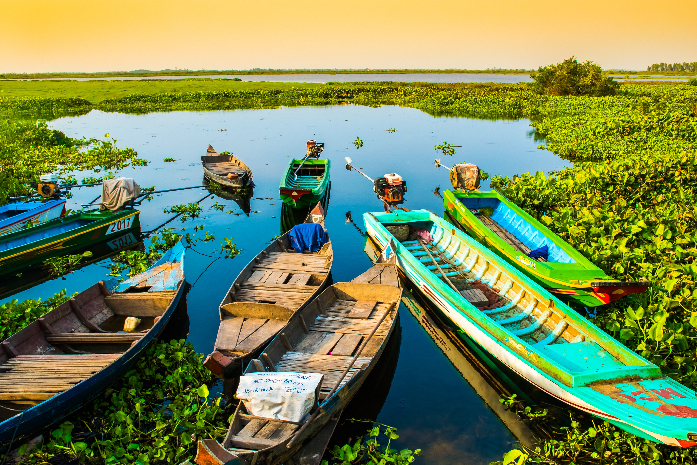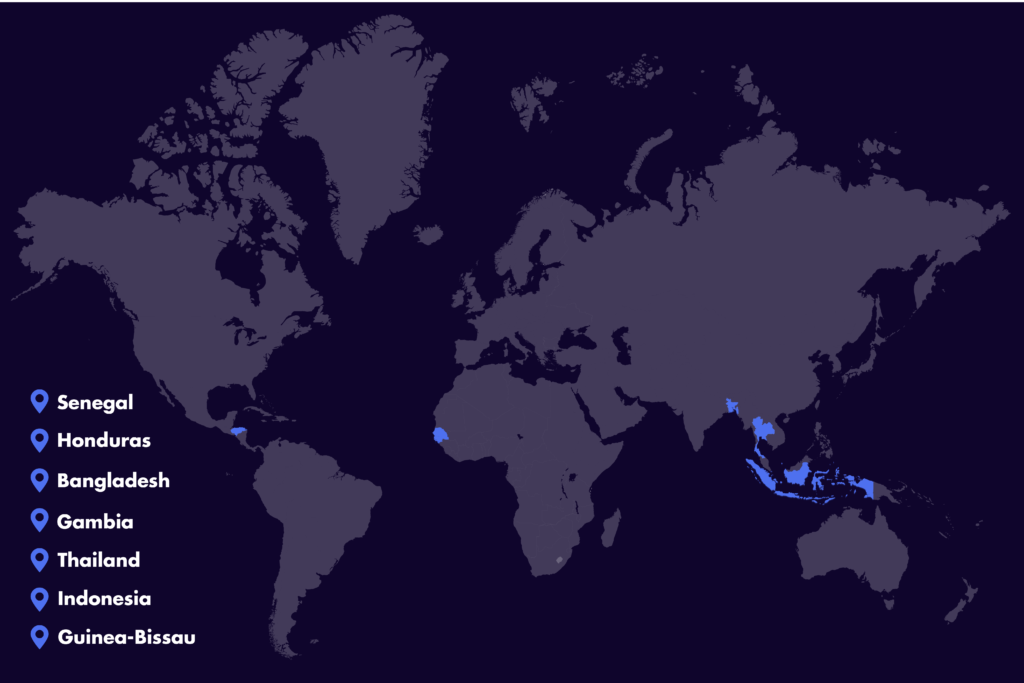Our work
Empowering communities isn’t just an end goal; it’s an ongoing commitment to understanding, learning, and evolving together towards a fair and sustainable future.
Turning Tides is the result of an extensive process undertaken to understand the landscape of current capacities and services, needs, wants, and opportunities for strengthening the recognition of rights and tenure associated with local communities, small-scale fishers and fish workers, and Indigenous Peoples.
Guiding lights: Our principles
Make giving more proximate
Focus end support on partners
We will always work to directly fund organizations and intermediaries that legitimately represent our partners.
Embrace co-design and decision-making
Our grantmaking is rooted in partners’ lived experiences, co-developing strategies and allowing partner input in grant decisions.
Embrace equitable grantmaking principles
We trust partners with flexible, multi-year grants, minimal administrative burden, and communication and reporting in partner-preferred ways.
Consider a diversity of end recipients
We support a variety of entities, including nonprofits, cooperatives, and grassroots movements, adjusting grants to meet their needs.
Recognize diversity within groups
We recognize between and within group differences in experience and perspectives, and we prioritize gender and social inclusion in culturally appropriate ways.
Provide services beyond the check
We can swiftly connect partners to service providers with shared values and providers that they prefer.
Ensure we can rapidly respond to acute need
We can address and support urgent needs, and adapt to changes for strategic opportunities.
Holistic grantmaking
We approach our work within the full spectrum of approaches and diverse actions to support partners’ well-being and agency.
We embrace a liberatory approach rooted in social justice and liberation.
Our commitment is to challenge existing power dynamics and structural barriers that are hindering local communities, small-scale fishers and fish workers, and Indigenous Peoples from advancing their goals and agendas.
Liberatory practices we are working towards
Shared decision-making
Trust-based, equitable approaches to grantmaking and partnerships
Commitment to transparency, mutuality, and ethical engagement
Emphasis on inclusivity, including free, prior, and informed consent
Internal culture focused on critical reflexivity, collaboration, learning, and service
“This is our commitment – humility and reflexivity, action learning, responsiveness to partners”
How we view tenure
Ongoing Learning
How we view change to happen
Harmony in Diversity:
Our Understanding of Tenure


Tenure refers to the ways in which the law – and societies – define and regulate people’s relationships and rights associated with land, oceans, coasts, waterways and resources.
Whilst Western economics and law often consider tenure as property ownership, it is more usefully viewed as a bundle of rights. Local and indigenous views of tenure are more holistic than just ownership or rights; embedding rights with responsibilities, including diverse relationships between society and nature, and considering the past,
present and future. A further exploration of tenure is provided in the report “Marine, Coastal and Shoreline Tenure”, and the sources it cites.
“Our commitment to listening, learning, responsiveness, and acting on feedback”.
“Our commitment to listening, learning, responsiveness, and acting on feedback”.
Before Turning Tides was launched, we conducted an extensive consultation process including over 100 hours of hearing experiences, views, perspectives and direct advice from groups and individuals. Whilst we completed our “consultation phase”, the centrality of consultation, learning and adjustment is an ongoing commitment of Turning Tides.
We recognize and invest in our own need to continually reflect upon our operations – including in partnerships – to be effective, respectful and open to multiple ways of knowing and working. To this end, we have supported seven pilot projects with partners working in Thailand, Bangladesh, Indonesia, West Africa and Honduras.
- Improving legal services & literacy with women toward tenure rights,
- Securing blue carbon ecosystems, sustainable fisheries & climate change adaptation for fishers
- Building inclusive marine spatial planning, carbon credit & taxation practices
- Enacting management rights to secure tenure
- Working toward tenure reform for Indigenous territories & local community territories
- Securing land tenure rights of women fish processes and traders
- Advancing the defence of Garifuna Ancestral Rights
The partners leading these projects (often through multi-partner collaborations) are working in a range of ways toward tenure security. These 7 pilots continue under Turning Tides and are key in influencing institutional design. Pilot partners have been willing to start a learning partnership with us – to ensure that we are learning, building, and adjusting Turning Tides towards efficacy and the needs of our partners.
Where are we turning the tide?
We are working across Asia, Africa, and Latin America with 7 sets of partners. In each pilot partners are addressing unique challenges with their chosen approaches. These pilots are instrumental in our continuous learning – shaping our ways of partnering to be enabling for our partners, and in line with our values.

Let's chart a path for a fair and sustainable future.
Do you what to know more?
Check the complete document
Self-determination, meaningful participation and locally led action become possible diverse rights of local communities, small-scale fishers, fish workers, and Indigenous Peoples are recognized. To move toward secure tenure and recognized rights it is these peoples that must be centered in resourcing and actions – with direct funding and greater control in fund distribution. We engage with a diversity of partners – across multiple levels – who are affecting governance of oceans, coasts, rivers, lakes, climate responses, conservation and food systems.
We collaborate most closely with local communities, small-scale fishers, fish workers, Indigenous Peoples, and their representative groups and allies. Throughout these partnerships we pay particular attention to strategies that promote social inclusion and gender equity. We employ and support targeted strategies with women, non-elite and economically disadvantaged peoples. We collaborate with partners who support different social groups and peoples to improve their experiences, agency and power within established legal, economic and social systems. The work we support will lead to greater quality and accessibility of services for facilitation, negotiation, documentation, registration, conflict resolution, and remedy.
We support ongoing efforts to build accountability, respect and awareness amongst governments, NGOs, funders and the private sector, ensuring rights recognition and tenure sensitivity in the policies and processes they employ. We support work that evaluates and diversifies the values and knowledge systems that are influencing these decision makers. We support work that changes and/or challenges (including via strategic litigation) inequitable or unjust legal, economic and social conditions, processes or policies that are undermining tenure security and rights in the governance of oceans, coasts, lakes, shorelines, and other aquatic systems.
How we view tenure
Harmony in Diversity:
Our Understanding of Tenure


Tenure refers to the ways in which the law – and societies – define and regulate people’s relationships and rights associated with land, oceans, coasts, waterways and resources.
Whilst Western economics and law often consider tenure as property ownership, it is more usefully viewed as a bundle of rights. Local and indigenous views of tenure are more holistic than just ownership or rights; embedding rights with responsibilities, including diverse relationships between society and nature, and considering the past,
present and future. A further exploration of tenure is provided in the report “Marine, Coastal and Shoreline Tenure”, and the sources it cites.
Our commitment
“Our commitment to listening, learning, responsiveness, and acting on feedback”.
“Our commitment to listening, learning, responsiveness, and acting on feedback”.
Before Turning Tides was launched, we conducted an extensive consultation process including over 100 hours of hearing experiences, views, perspectives and direct advice from groups and individuals. Whilst we completed our “consultation phase”, the centrality of consultation, learning and adjustment is an ongoing commitment of Turning Tides.
We recognize and invest in our own need to continually reflect upon our operations – including in partnerships – to be effective, respectful and open to multiple ways of knowing and working. To this end, we have supported seven pilot projects with partners working in Thailand, Bangladesh, Indonesia, West Africa and Honduras.
- Improving legal services & literacy with women toward tenure rights,
- Securing blue carbon ecosystems, sustainable fisheries & climate change adaptation for fishers
- Building inclusive marine spatial planning, carbon credit & taxation practices
- Enacting management rights to secure tenure
- Working toward tenure reform for Indigenous territories & local community territories
- Securing land tenure rights of women fish processes and traders
- Advancing the defence of Garifuna Ancestral Rights
The partners leading these projects (often through multi-partner collaborations) are working in a range of ways toward tenure security. These 7 pilots continue under Turning Tides and are key in influencing institutional design. Pilot partners have been willing to start a learning partnership with us – to ensure that we are learning, building, and adjusting Turning Tides towards efficacy and the needs of our partners.
Where are we turning the tide?
We are working across Asia, Africa, and Latin America with 7 sets of partners. In each pilot partners are addressing unique challenges with their chosen approaches. These pilots are instrumental in our continuous learning – shaping our ways of partnering to be enabling for our partners, and in line with our values.

Let's chart a path for a fair and sustainable future.
Do you what to know more?
Check the complete document
How we view change to happen
Self-determination, meaningful participation and locally led action become possible diverse rights of local communities, small-scale fishers, fish workers, and Indigenous Peoples are recognized. To move toward secure tenure and recognized rights it is these peoples that must be centered in resourcing and actions – with direct funding and greater control in fund distribution. We engage with a diversity of partners – across multiple levels – who are affecting governance of oceans, coasts, rivers, lakes, climate responses, conservation and food systems.
We collaborate most closely with local communities, small-scale fishers, fish workers, Indigenous Peoples, and their representative groups and allies. Throughout these partnerships we pay particular attention to strategies that promote social inclusion and gender equity. We employ and support targeted strategies with women, non-elite and economically disadvantaged peoples. We collaborate with partners who support different social groups and peoples to improve their experiences, agency and power within established legal, economic and social systems. The work we support will lead to greater quality and accessibility of services for facilitation, negotiation, documentation, registration, conflict resolution, and remedy.
We support ongoing efforts to build accountability, respect and awareness amongst governments, NGOs, funders and the private sector, ensuring rights recognition and tenure sensitivity in the policies and processes they employ. We support work that evaluates and diversifies the values and knowledge systems that are influencing these decision makers. We support work that changes and/or challenges (including via strategic litigation) inequitable or unjust legal, economic and social conditions, processes or policies that are undermining tenure security and rights in the governance of oceans, coasts, lakes, shorelines, and other aquatic systems.